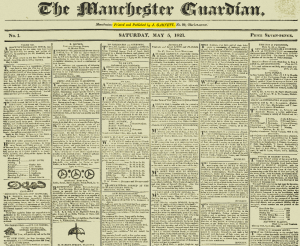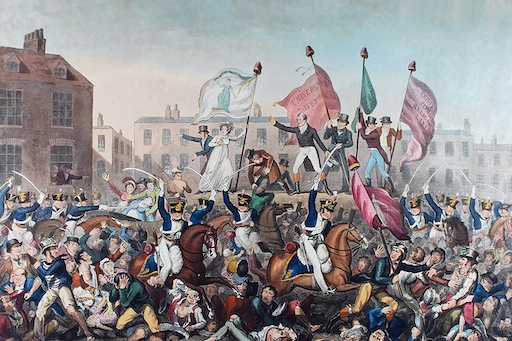5th May 1821: On this day, the publication in Manchester of the first edition of The Manchester Guardian and, on Saint Helena, the death of Napoleon Bonaparte.
Today The Guardian celebrates its 200 year anniversary – no mean feat when one considers the fragile nature of media enterprises, not just in our own time, but the struggles for survival of newspapers and periodicals from their very beginnings.

The Manchester Guardian (as it was called until 1959) was founded by John Edward Taylor in the aftermath of the closure of the Manchester Observer. This more radical publication had been charged with sedition for their role in agitating for parliamentary reform and promotion of meetings on St. Peter’s Field in Manchester, that culminated in a mass gathering on 16th August 1819 during which the cavalry charged into the crowd of thousands of mostly ordinary folk protesting against economic hardship and demanding the rights of greater suffrage and representation.

The massacre would become known as Peterloo, a portmanteau created from the location, St. Peter’s Field, and the Battle of Waterloo that had taken place four years earlier. That battle, which marked the end of the Napoleonic Wars, was also the beginning of trade restrictions and the infamous Corn Laws in Britain that benefitted the gentry and land owners but, by raising the price of food staples, brought hardship to the working classes. Some in attendance in Manchester that day would very well have been there on those Belgian fields and participated in one of Britains greatest military victories. Just is that not.
That on the very same day as the publication of the first edition of The Manchester Guardian, that same French emperor who had been defeated at Waterloo should die (and with his boots on) on a remote island in the middle of the South Atlantic, could hardly have been expected to be reported upon – long as it was before even rudimentary undersea telegraph cable – but the coincidence would surely have later been noticed and remarked upon. [And indeed it was, following a July 14 (just had to be didn’t it!) report from Paris, on July 28, and here it is from the The Guardian archives]
And so it is, two hundred years after his death, Napoleon’s shadow still looms large in the annals of history; he continues to fascinate, for better or worse, and France still struggles to come to terms with a legacy full of contradictions. And The Guardian is still around to tell us about it.
Despite our contemporary media being dominated by mass, rapid-fire organs of communication, driven by capital and algorithms, the legendary centennial essay by CP Scott is as relevant as ever; the same basic principles of which Scott wrote one hundred years ago apply still, and should remain the ideal for any good news publication.
[…] Fundamentally it implies honesty, cleanness, courage, fairness, a sense of duty to the reader and the community. A newspaper is of necessity something of a monopoly, and its first duty is to shun the temptations of monopoly. Its primary office is the gathering of news. At the peril of its soul it must see that the supply is not tainted. Neither in what it gives, nor in what it does not give, nor in the mode of presentation must the unclouded face of truth suffer wrong. Comment is free, but facts are sacred. “Propaganda”, so called, by this means is hateful. The voice of opponents no less than that of friends has a right to be heard. Comment also is justly subject to a self-imposed restraint. It is well to be frank; it is even better to be fair. This is an ideal. Achievement in such matters is hardly given to man. Perhaps none of us can attain to it in the desirable measure. We can but try, ask pardon for shortcomings, and there leave the matter.[…]
CP Scott, Manchester Guardian – 5th May 1921
Postscript May 7, 2021: Online and in May 27th issue of The New York Review of Books is a comprehensive overview of The Guardian’s 200 year history by former editor, Alan Rusbridger. I swear I didn’t steal the Napoleon narrative! Loathsome it is, not to be as original as one would like to think! But then getting from Peterloo to Napoleon is hardly a stretch. To quote:
[…]And yet this year it is celebrating its two hundredth anniversary. Born on the day Napoleon Bonaparte died—May 5, 1821— […]
The 750 journalists who work at The Guardian today can reflect that their predecessors eventually got around to reporting the death of Napoleon nearly two months later […]
The original investors were not in it for a quick buck: indeed, they were quite ready to lose their seed capital. They came together to start a newspaper because they felt that Manchester—a city built on the growth of the cotton industry, powered by new factories and mills, and gripped by the hunger for political reform—needed one, even though it already had at least five.
A clue to their motives can be found in the Peterloo Massacre of August 16, 1819. Eighteen people were killed and as many as 670 were injured when the cavalry, encouraged by the local Manchester magistrates, charged into a crowd of working-class protesters peacefully demanding greater political representation.[…]
from “Two Centuries of The Guardian” by Alan Rusbridger May 27, 2021 issue of The New York Review of Books.
Access to the NYRB is fairly limited, but Rusbridger’s piece is terrific; describing (with affection but not uncritically) how the publication continues to be – can not help but be – defined in terms of its founding premises and a turbulent history spanning two centuries.

